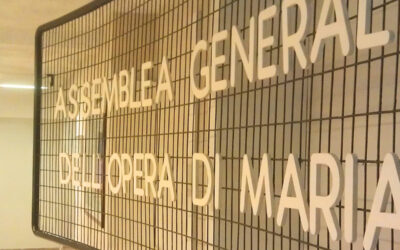 Following a period of illness and retreat in Switzerland in the early 1990′s, Chiara Lubich engaged the Focolare in a rapid opening to local society and to faraway peoples. Certainty that the Movement was fully inserted in the Church spurred an extraordinary season of dialogue, journeys and public recognitions. A number of honorary degrees, citizenships and prizes on every continent (see timeline) showed how her Ideal and its influence had reached a high point.
Following a period of illness and retreat in Switzerland in the early 1990′s, Chiara Lubich engaged the Focolare in a rapid opening to local society and to faraway peoples. Certainty that the Movement was fully inserted in the Church spurred an extraordinary season of dialogue, journeys and public recognitions. A number of honorary degrees, citizenships and prizes on every continent (see timeline) showed how her Ideal and its influence had reached a high point.
The period between 1994-2004 saw the start and consolidation of deeper and expanded dialogue with faithful of the Great Religions especially in the East; a large series of activities promoted by the Movement that advanced the contribution of the charism of unity in the fields economics, politics, communication, health, and more; the launching of a large scale effort engaging politics and ecumenism in giving a “soul” to Europe.
 Following this long period of journeys, foundations and new frontiers, Chiara’s health began to fail. The last three years of her life on earth were perhaps the most difficult. Jesus Forsaken, her Spouse, presented himself to her “in a solemn way”, in a darkness where it seemed that God was “like the sun when it sets and is lost beyond the horizon”. Nonetheless, moment by moment Chiara continued to love person after person, one person at a time. She continued to place herself at the service of God’s design on the Movement, overseeing its development until the very last days of her life when, to her great joy, Sophia University was instated as a Pontifical University Institute.
Following this long period of journeys, foundations and new frontiers, Chiara’s health began to fail. The last three years of her life on earth were perhaps the most difficult. Jesus Forsaken, her Spouse, presented himself to her “in a solemn way”, in a darkness where it seemed that God was “like the sun when it sets and is lost beyond the horizon”. Nonetheless, moment by moment Chiara continued to love person after person, one person at a time. She continued to place herself at the service of God’s design on the Movement, overseeing its development until the very last days of her life when, to her great joy, Sophia University was instated as a Pontifical University Institute.
She had spent her final month in Gemelli Hospital, in Rome. From there she still managed brief correspondence and decisions for the Movement. She also received a letter from the Pope which she re-read often because it gave her great comfort. The Ecumenical Patriarch of Constantinople, Bartholomew I visited her in hospital and gave her his blessing.
During the final days she more than once expressed a desire to return home. Once there, she said goodbye to her first companions and close collaborators. Then, as her condition worsened and she began to fade away, an endless line of people passed by her bedside, to see her, kiss her hand, to say thank you. The emotion was intense, but so were the faith and love. The Magnificat was intoned in thanksgiving for the great things the Lord had done in Chiara, and as a renewed pledge to live the Gospel, to love in the way Chiara had always taught and done.
Chiara passed away on March 14, 2008 just after two o’clock in the morning. The news quickly spread to the members of her spiritual family around the world, who were united in prayer.
 In the days that followed thousands of people, from plain working men to political and religious leaders began to arrive in Rocca di Papa to honour her. The funeral was held in the Roman Basilica of St Paul Outside the Walls, but was unable to hold the huge crowd that had arrived (over 40,000 people). Vatican Secretary of State Tarcisio Bertone presided at the Eucharistic Celebration which was con-celebrated by 9 cardinals, 40 bishops and hundreds of priests. Cardinal Bertone read the message sent by Benedict XVI in which the Pope described Chiara as a “Woman of intrepid faith, a meek messenger of hope and peace”.
In the days that followed thousands of people, from plain working men to political and religious leaders began to arrive in Rocca di Papa to honour her. The funeral was held in the Roman Basilica of St Paul Outside the Walls, but was unable to hold the huge crowd that had arrived (over 40,000 people). Vatican Secretary of State Tarcisio Bertone presided at the Eucharistic Celebration which was con-celebrated by 9 cardinals, 40 bishops and hundreds of priests. Cardinal Bertone read the message sent by Benedict XVI in which the Pope described Chiara as a “Woman of intrepid faith, a meek messenger of hope and peace”.
Some words spoken by Chiara resounded among the crowd: On your day, my God, I shall come to you. . . . I shall come to you, my God. . . . with my wildest dream come true: to bring you the world in my arms. That all may be one!”




0 Comments